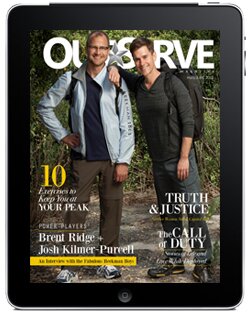Conquering the World
Underneath my cover, I walk a straight line, returning salutes as I pass. A sergeant salutes and says, “Good morning, Sir.”
A warm glow flushes my cheeks, and I reply, “Good morning!” Closer to work a familiar face draws near and salutes; “Good morning, Ma’am.” A heavy feeling of discontent weighs on me, and I return the salute with the grudging reply, “Good morning.”
I am a transgender military officer. Outside of work, I live my life as a man. Once on post, I am female. My short hair and manly features present an androgynous and confusing appearance.
I grew up in Arkansas, and knew that many outsiders perceived women there as “barefoot and pregnant” rednecks. That stereotype drove me to move out of the state and join the Army. I wanted to be on an equal footing with men. I found new confidence along the way as my drive to exceed expectations helped me rise through the ranks. Yet, I always had the feeling of being a second class soldier because of my gender.
Males have confidence ingrained in them at an early age. Men are encouraged to stand up for themselves and speak their mind. When they don’t, they are often labeled effeminate or called derogatory terms such as faggot or princess. The “stereotypical male” role is enforced by men as well as women. A woman speaking to a man that seems effeminate will treat him differently.
I elicited slurs such as “tomboy” or “lesbian” because I was seen as a strong female. Although I wore these labels proudly, I never felt as if I measured up to the boys in my class. As a female, I was encouraged by my parents to play sports and follow my interests in math and science. They were very supportive and allowed me to pursue what I wanted. Society, on the other hand, looked down on my pursuit of more stereotypically male interests. After all, women are expected to want to marry and have children.
I always knew that I was not just a strong woman. I have known from an early age that one day I would grow up and be a man. It wasn’t until the past few years that I came to realize that I could do something about it.
Patriarchal dominance in society keeps women from reaching their highest potential. In the military, denying women roles in combat ensured men always held the positions of highest authority. Women were enshrined as something less, trapped beneath a glass ceiling. This is changing now with Secretary Panetta’s historical lifting of the ban of women in combat. However, the mindset of some will never change. Mitigating generations of dogma about women will take time and effort. Bringing young women up to see unlimited role models and opportunities will be a big part of ushering in the next generation of leading women.
As a trans man, I recognize the male privilege that surfaces when I am recognized as male. I am seen as knowledgeable about the mechanics of my truck even if I have no clue what is causing my starter to not turn over. I can buy a new car without having someone try to pull the wool over my eyes. I can call the plumber, and he speaks with me as an equal. Rebecca Solnit observed this too, and wrote:
“Men explain things to me, and to other women, whether or not they know what they’re talking about…every woman knows what I mean. It’s the presumption that makes it hard, at times, for any woman in any field; that keeps women from speaking up and from being heard when they dare; that crushes young women into silence by indicating, the way harassment on the street does, that this is not their world. It trains us in self-doubt and self-limitation just as it exercises men’s unsupported overconfidence.”
Internalized privilege generates the confidence that I exude when returning a salute after being called “sir”. I have no preconceived lack of ability. I can be called upon to run an operation without my superiors thinking I need help. Sometimes, I think all of this may be just in my head. But then, I’ve seen this first-hand far too many times when male officers were chosen over me even though I was more qualified.
I did not transition to gain male privilege. Some lesbians, however, perceive me as a traitor. Inheriting male privilege is a by-product of transitioning from female to male. Hopefully, one day the world will rid itself of the patriarchal mindset. Women are different than men, but everyone should have the same opportunity to excel. Misogyny has no place in our military, and I am gratified leadership moving to affirm this.
In that moment where I am called “sir”, though, I feel like I can take on the world.
***
About the Author: Evan Young is originally from Little Rock, Ark. He graduated basic training in 1989, transitioned from a sergeant to lieutenant in 1998, and rose to the rank of Major before retiring. In 1998, Evan graduated from Northwestern State University of Louisiana with a B.A. in English. From there, he continued his studies while on Active Duty and graduated from Nova Southeastern University in Florida with a M.S. in Computer Information Management. He earned his public affairs credentials in 2004 and broadcasting management credentials in 2007. He served in the Reserves, Guard, and Active Duty. He was the Hawaii National Guard Public Affairs officer and a Media Officer at NORAD and US NORTHCOM. Evan began transition in 2011. He retired from the Army as a Major in 2013. Since then he began his own web development company and has written for OutServe Magazine as a blogger. Evan and his partner currently live in Spring Lake, Mich., with their two children.







